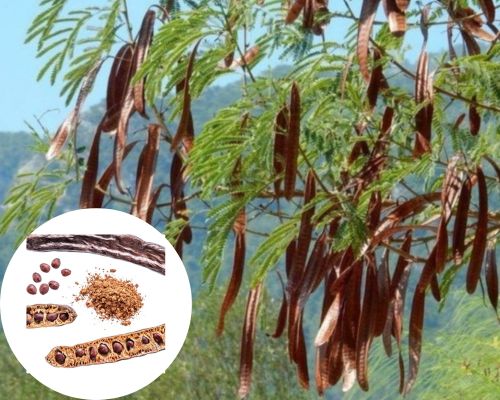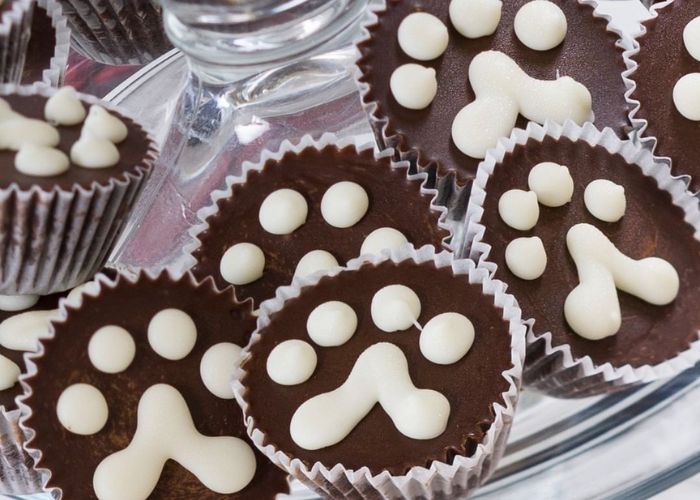When it comes to exploring nutritious treats, carob has emerged as a popular choice for dogs. Derived from the pods of the carob tree, this cocoa-like delight offers a delectable alternative to chocolate, which is known to be toxic to dogs. What sets Carob apart is its exceptional safety profile, making it a canine-friendly option that pet owners can confidently indulge their furry friends in.
By understanding the science behind carob’s safety and its role as a treat, we can make interesting choices that contribute to our dogs’ happiness and overall health.
In this article, we explore the key facts surrounding carob, its nutritional value, and its potential advantages for dogs.
Facts about Carob
Appearance:

Carob is a fruit of the carob tree. They are basically elongated pods of about 6-8 inches long which contain seeds surrounded by a sweet and edible pulp. Carob is available in various forms, such as powder and chips, making it easy to incorporate into treats or meals.
Taste and Flavor:
Carob has a gently sweet taste with a subtle nutty undertone, resembling the flavor of cocoa but without the bitterness found in chocolate. This mild taste makes carob an appealing option for dogs, especially those with a fondness for sweets.
Consumption:
Dogs can enjoy carob in its raw or cooked forms. However, most commercial carob products for dogs are formulated to enhance their flavor, texture, and suitable kibble size for your dog. Carob pods are typically dried and roasted before being ground into powder which is substituted for cocoa to bake treats for your pet or sprinkle over their meals.
Nutritional Value:
Carob is renowned for being a safe alternative to chocolate, which is harmful to dogs due to its theobromine content. Carob contains no theobromine, making it a safe treat. Furthermore, it offers dietary fiber that aids digestion and natural vitamins and minerals like calcium, magnesium, and potassium.
Allergen-Free and Low in Fat:
If your dog has allergies or sensitivities, carob could be a great option as it’s free from common allergens like gluten and dairy. It’s also a low-fat treat, suitable for dietary restrictions and weight management especially for dogs with slow metabolism like the great Pyrenees.
Is carob safe for your dog?

Carob, known for its mild cocoa-like flavor, can indeed be a safe treat option for your dog, provided certain precautions are taken.
One crucial aspect to remember is the importance of choosing unsweetened carob products. Not every carob product on the shelve is natural and healthy. Some commercially sold carob are spiked with sugar to make them more sweeter. It is therefore important to look for high-quality carob products from reputable sources that are specifically designed for dogs, and marked by clear ingredient lists. This practice ensures that your dog receives a safe and carefully crafted treat.
Also, moderate your dog’s carob consumption. Much like any treat, moderation is key. A general guideline is to offer your dog around 2 to 3 carob pieces per day. This balanced approach guarantees that carob complements your dog’s diet without overwhelming it.
While carob is generally regarded as safe, it’s important to stay attentive to your dog’s reactions. Different dogs have unique sensitivities and respond differently to new foods. As you introduce carob into their diet, observe for any unexpected symptoms or reactions. In the event you notice anything unusual, consulting your veterinarian is always a prudent step.
It is also important to seek the advice of your veterinarian before making dietary changes. Their expertise can offer tailored advice based on your dog’s unique health profile, helping you make informed decisions about integrating carob into their routine.
Carob health benefits for your dog

Incorporating carob into your dog’s diet, while being mindful of portions and consulting your veterinarian, can offer a range of nutritional advantages.
Carob is rich in dietary fiber content which aids in digestion and contributes to a healthy gastrointestinal system in your dog. It is also naturally abundant in magnesium and potassium which play a vital role in muscle and nerve function maintaining healthy bones and a healthy heartbeat for your pet.
Carob will help keep your dog’s immunity in check as it contains anti-oxidant compounds that combat harmful free radicals in the body. These antioxidants contribute to your dog’s immune system and can potentially reduce the risk of chronic diseases, supporting their long-term well-being.
Your pet will enjoy this treat without compromising their health as carob is low in sodium and fat content.
Carob is not just a treat but a healthy kind of treat that you should consider introducing to your furry friend.
FAQ
How do I use carob for my dog?
Carob is best used as an ingredient for dogs. Dogs can eat carob in any form be it powder or raw pods. However, offering your dog carob powder as a snack can be a messy experience while pods pose a threat to choking. It’s therefore advisable to ground the pods and use the powder in baked treats or sprinkle in smoothies.